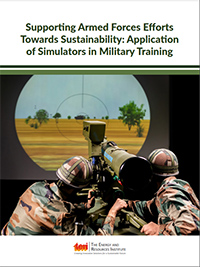Accelerating Sustainable Training in the Armed Forces
By assessing the carbon footprint of India's defence sector, the project aims to recommend technology interventions such as simulator-based training to cut down the sector's GHG emissions while retaining the training efficacy of defence personnel
Synthesis of the IPCC’s 6th Assessment Report released in March 2023, spells out climate change’s disastrous consequences on the environment in the coming decades. The nature of the problem is unique, the impact is all-encompassing, and the risks to both infrastructure and human life are high. It also underscores the urgency of taking more ambitious action and, if countries act now, the world still has a chance to secure a livable and sustainable future for all.
While the goal of the defence sector is ensuring national protection, rising Greenhouse Gas (GHG) contribution in its operations requires urgent actions aimed at decarbonizing the sector. The global defence industry’s contribution to worldwide CO2 emissions can increase from its current level of 2% to 25% by 2050. From an economic standpoint, the military sector is one of the largest spenders in the world. In 2020, global military expenditure touched $2 trillion, which is almost the equivalent of the GDP of several developed countries. Thus, given the magnitude of its operations, it is imperative that collectively the defence industry must adopt strategic initiatives focused on reducing its carbon footprint.
The Energy and Resources Institute (TERI) with the support of Zen Technologies produced a cutting-edge study on how cohesively simulator-based training can help the defence forces reduce their carbon footprint. Assessing the environmental benefits of technological interventions TERI, through this exercise, has found that simulators can help the Armed Forces reduce their overall carbon emissions without compromising on the training efficiency of defence personnel. Given that global emissions for the defence sector will rise considerably over the next couple of years, we believe that the increased adoption of simulated training will help the military assist India towards achieving its climate commitments.

